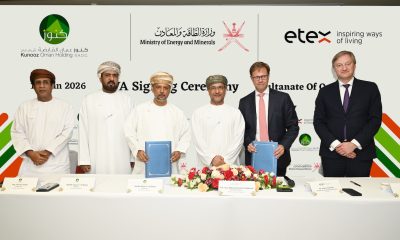Leaders Speak
Diversifying investment – by Zakir Banatwala

We spent the last month visiting several GCC Financial Centres meeting a mix of businessmen, asset managers and bankers, where we were invited to present our Global Fund. Although we were prepared for the barrage of “where are oil prices headed”, what shocked us is the lack of diversification and over exposure to oil by investors.
Middle East economies remain overly dependent on oil. Although the respective governments continue to push the diversification agenda, progress has not been as rapid as we would all hope for. The issue at heart is that countries are naturally endowed with certain resources, and diversifying away from them is a process that takes years in the making, if not decades. For a country like Oman which obtains an overwhelming majority of its revenue from oil, building and developing other sectors of the economy is not a simple and straightforward task. One must delicately balance spending on infrastructure, social services like education and healthcare, supporting local employment, and developing the oil industry to ensure future production, with diversifying the economy away from oil. For every rial generated by the government from oil sales, there are multiple sectors or investments that are fighting for their share of it. Amongst them all, diversification has the slowest pay-off and often gets neglected in favour of others.
Given the above framework, the relatively slow speed of diversification at a country level is understandable. What is alarming, however, is the lack of diversification at the individual level. For this, there is no explanation. Individuals residing in the Middle East have a strong home bias with the majority of their assets invested in the domestic economy. Business, real estate and savings are all kept locally. Although in the past they have generated handsome returns, there is no denying that investors carry the risk of overexposure to a single country, which in turn is overexposed to a single commodity. From an investing perspective, it makes little sense to keep allocating additional monies back into the same asset or country. Diversification should be the key guiding principle.
While the term diversification is extremely popular, its application in investing is often misunderstood. Historically speaking, investors felt diversification meant owning multiple asset classes (stocks, bonds, currencies, real estate, businesses) in different countries would protect them from risks concentrated in any one particular market or asset. For a number of years this strategy worked, until one day along came the 2008 financial crisis. What once started off as a noble cause of encouraging home ownership in the United States, eventually led to the bursting of the US housing bubble which threatened to shut down the global financial system. Investors across the globe, located in the United States or in Oman, all suffered substantial declines in their portfolio.
Edward Lorenz, an American mathematician and meteorologist, was a pioneer of chaos theory and coined the popular term butterfly effect while studying weather patterns. “Does the flap of a butterfly’s wings in Brazil, set off a tornado in Texas?” Or for investing purposes, “can highly levered individuals and banks in the US, set off a tornado in the rest of the World?” The answer is a resounding yes. The crisis and its aftermath has been a stark reminder to the strong interlinkages across all corners of the world. It is no longer sufficient for investors to manage or invest a portfolio in each local market individually. It is imperative to have an actively managed global strategy, to capitalise on opportunities and avoid unnecessary risks.
Diversification and global markets are among the key strengths of our Global Fund. Chief investment officer, Alexander Calvo, was one of the most senior fund managers at Franklin Templeton Investments, where he managed over $30bn in client assets. He also served as a director of global fixed income, and was a member of the Global Asset Allocation Committee. We have launched the StratEdge Global Macro Fund to help investors gain a strategic edge in global markets, and enable them to protect and grow their capital. Our fund was very well received in the GCC which has reinforced our decision to spend more time in the region and focus our efforts developing our business here. In this day and age, investors have the ability to invest in multiple geographic and product sectors. However, they seldom take advantage of this.
(The author is Vice President and Portfolio Manager for global fixed income and equity strategies at StratEdge Quant Investors)
-

 News2 months ago
News2 months agoAI Security Conference 2025 Hosted by Securado Highlights the Changing Cybersecurity Landscape
-

 Insurance2 months ago
Insurance2 months agoSupporting Community Wellness: Liva Insurance Sponsors Muscat Marathon 2026 with Free Health Checkups
-

 Interviews1 month ago
Interviews1 month agoEXCLUSIVE INTERVIEW: TLS Rebranding Marks Strategic Leap Toward Innovation, Sustainability & Growth
-

 Insurance1 month ago
Insurance1 month agoLiva Insurance Supports Community Wellness Through “Experience Oman – Muscat Marathon 2026”
-

 Investment3 weeks ago
Investment3 weeks agoLalan Inaugurates Its First Overseas Manufacturing Facility, Marking Sri Lanka’s First Investment in SOHAR Freezone
-

 Banking & Finance1 month ago
Banking & Finance1 month agoA New Platform for SME Growth: Oman Arab Bank Unveils Tumouhi
-

 News3 weeks ago
News3 weeks agoKunooz Oman Holding Partners with Belgian company Etex for Local Gypsum-Based Business Development
-

 Construction4 weeks ago
Construction4 weeks agoInternational Heavy Equipment hosts Open Day at its Refurbished Facility in Sohar Industrial Area






























You must be logged in to post a comment Login